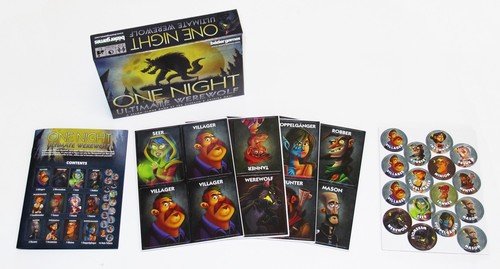While the game is great fun, it suffers from a number of mechanical difficulties, which One Night Ultimate Werewolf (3-10 players, ages 8+) addresses.
The two biggest problems with classic Werewolf are the need for a non-playing moderator, and the fact that players who are killed early in the game (sometimes before they get a chance to do anything at all) are in for lots of downtime.
One Night Ultimate Werewolf tackles the first problem by replacing the moderator with a smartphone/tablet app (you can also memorize the moderator script and use a stopwatch or egg timer in a low-tech setting), and the second by limiting the game to a single night during which nobody dies, ten timed minutes of discussion, and a single win-or-lose vote. This works because the game both introduces additional uncertainty about who everyone is; and gives several Villagers a very limited amount of semi-reliable information during the night.
At the start of the game, everyone gets a card with their role printed on it. This might be a Werewolf, a simple Villager, or a villager with a special power or action. Three additional cards are dealt to the middle of the table. Then someone starts the app, and everyone closes their eyes. One by one, the app tells the special roles to "wake up" and do something which gives them a bit of information and/or changes the state of the cards. For example, the two Werewolves silently make eye contact (and if there is only one wolf they get to peek at a card in the middle); the Seer gets to peek at one or two cards; the Robber swaps cards with someone and looks at the new one; and the Troublemaker switches two other people's cards sight unseen.
Once everyone has performed their action, which takes about a minute in all, the app directs everyone to "wake up," and starts a timer to the final vote. This is when the insanity begins.
The Villagers need to logic out who's who from their scraps of incomplete (and possibly erroneous) information in order to correctly vote out a Werewolf at the end of the game. The Werewolves need to come up with plausible lies that misdirect suspicion onto Villagers, and back each other up without appearing too suspicious.
If Villagers wait too long before revealing what they know, they themselves look suspicious, but the sooner they reveal their info the harder it is to catch a werewolf in a lie. After a few games, Team Village starts realizing they can catch Werewolves more effectively if they lie as well, but then they have the additional burden of convincing their fellow Villagers they were lying for good reasons. Meanwhile, someone who thought they were a Werewolf could have had their card switched by the Troublemaker or Robber, giving them an incentive to out their partner and the Villagers an incentive to trick them into outing themselves.
In other words, in the course of a few rounds the strategy of a group playing One Night Ultimate Werewolf will quickly evolve from simple deduction, accusations, and bluffing to elaborate triple-reverse ruses and hilarious arguments. There are lots of special roles that change the balance and character of the game and add a lot of replayability. My family played this after our Passover Seder this year, stopping only when it really was way past time to get the little ones to bed; and there was general agreement that it's a new family tradition.
One particularly memorable game featured my brother, caught dead-to-rights as a Werewolf with 5 minutes remaining, delivering an impassioned, mostly nonsensical speech in which he wildly flipped back and forth between affirming and denying that he was a Werewolf. When the dust cleared and we all voted for him, it was revealed that the Robber had stolen his Werewolf card and coasted silently to the win while we watched him bluster.
One Night Ultimate Werewolf ($19)







